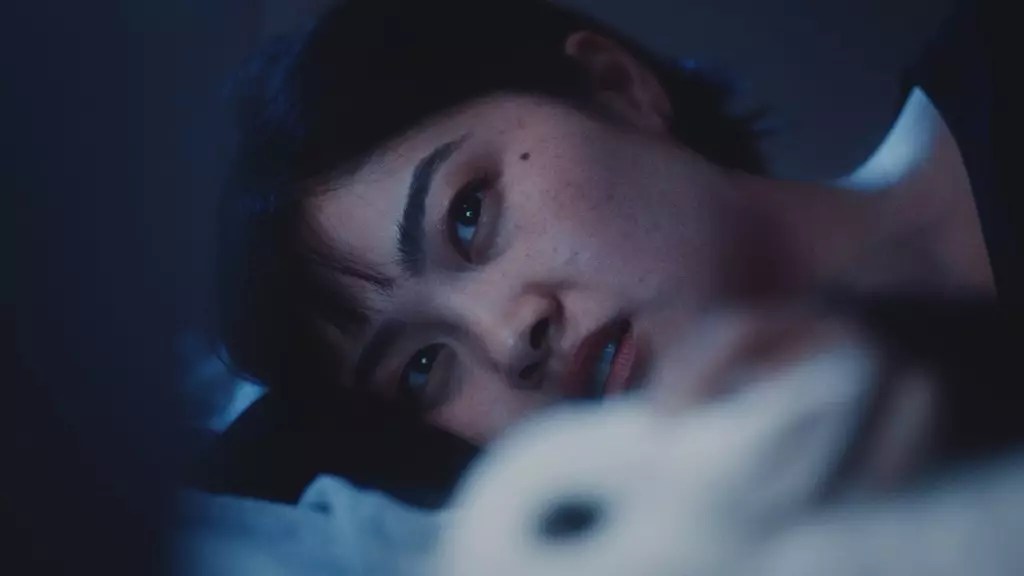Katarina Zhu’s feature film debut, *Bunnylovr*, serves as a compelling exploration of self-identity amidst the chaos of modern urban life and digital connections. Zhu portrays Becca, a young Chinese American woman who is entangled in contrasting worlds: the rigorous demands of everyday life in New York City and the often frenetic, chaotic existence as a cam girl. The film adeptly highlights her struggles with personal fulfillment, societal expectations, and the nuances of relationships, weaving an intricate narrative that reflects both personal and universal challenges.
Becca exemplifies the feeling of drifting through life, struggling to find genuine connection while grappling with the superficiality inherent in her profession. The decision to moonlight as a cam girl not only symbolizes her economic struggles but also her desire to gain validation through the attention lavished upon her by clients. This urgent need for recognition emerges as a poignant commentary on modern femininity and self-worth, layering complex questions regarding agency and autonomy on Becca’s interactions.
At the heart of *Bunnylovr* is Becca’s tumultuous relationship with the men in her life, each representing different aspects of her struggle for approval and love. Her estranged father, William, operates as a dark reminder of the familial bonds that are both supportive and suffocating. Their unexpected encounter on the street emphasizes not only the fragility of life but also the unfulfilled emotional expectations that complicate their relationship. William’s role as a gambler seeking redemption by using Becca as his “lucky charm” underscores the toxic dynamics often present in parent-child relationships.
Moreover, Becca’s friendships further illuminate her challenges. The character of Bella, portrayed by Rachel Sennott, brings both warmth and discomfort to Becca’s life. While Bella’s artistic endeavors flourish with Becca as her muse, the dynamics of their friendship reveal the fine line between admiration and objectification. Even though Bella seems to care deeply for Becca, the way she exploits her friend’s identity for her work raises questions about genuine support versus parasitic relationships.
Coupled with romantic tension from her ex, Carter, and her unsettling connections with clients like John, it becomes apparent that every interaction Becca has is tinged with the pressure to satisfy others, often at the cost of her own self-worth. The film insightfully navigates these interconnections, shedding light on the pervasive themes of exploitation and dependency present in modern relationships.
A notable aspect of *Bunnylovr* is the introduction of Milk, the rabbit. When Becca receives this unexpected gift from John, the bunny transitions from mere prop to a symbol of Becca’s emerging self-agency. Initially reluctant to acknowledge any emotional attachment to her new furry companion, Becca’s journey with Milk becomes emblematic of her struggle to care for herself amidst the constant sway of external demands. As she begins to nurture and protect Milk, a transformation unfolds, signifying her gradual reclamation of agency.
Milk’s presence reflects Becca’s inner desire to break free from the confines of her relationships. The rabbit, in all its innocence, serves as a grounding force that aligns with the film’s broader themes of self-love and emotional growth. By learning to nurture another being, Becca embarks on a journey towards self-acceptance, confronting the underlying trauma caused by her father’s absence and the often predatory nature of her interactions.
Ultimately, *Bunnylovr* invites its audience on a cathartic expedition through the myriad complexities of modern intimacy, particularly within the labyrinth of the digital age. Inspired by Zhu’s own experiences with her estranged father, the film resonates on a personal level while simultaneously engaging with broader cultural narratives about connection and isolation. Becca’s transformation from a people-pleaser to someone who prioritizes her own needs reflects a vital journey toward mindfulness, encouraging viewers to embrace self-compassion.
Through its nuanced storytelling, richly layered character interactions, and potent symbolism, *Bunnylovr* emerges as a compelling meditation on personal fulfillment in a world rife with distractions. It boldly confronts the paradox of seeking intimacy in an increasingly digital and isolating existence, ultimately affirming the power of self-love and authentic relationships amidst life’s chaos. This debut film holds a mirror to societal norms while simultaneously inviting introspection about the true meaning of fulfillment in our lives.


Leave a Reply